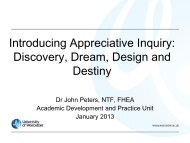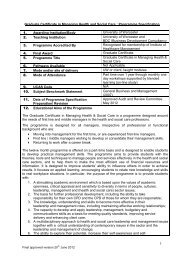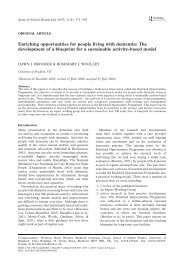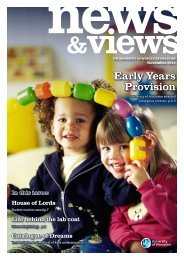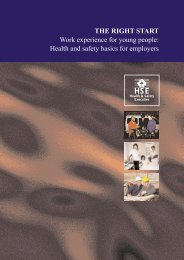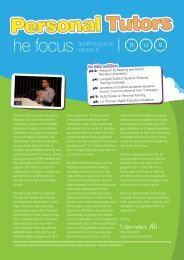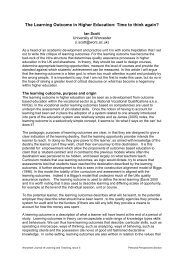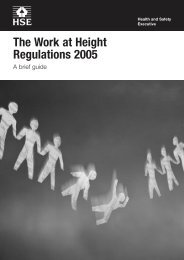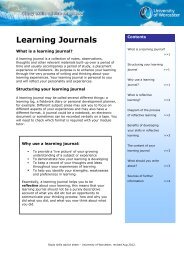Mentoring and Coaching stories - University of Worcester
Mentoring and Coaching stories - University of Worcester
Mentoring and Coaching stories - University of Worcester
You also want an ePaper? Increase the reach of your titles
YUMPU automatically turns print PDFs into web optimized ePapers that Google loves.
to underst<strong>and</strong> the mentoring/coaching relationship more, I turned my enquiry to find out aboutwhat activities mentors <strong>and</strong> students were engaging in to promote the pr<strong>of</strong>essional growth <strong>of</strong> thestudent. Interestingly, from my evidence there was a clear mis-match between what teachermentors said that they did with student teachers <strong>and</strong> the mentoring activities that the studentssaid they actually experienced. One explanation for this might be the tension between mentors’‘espoused theories’ <strong>and</strong> their ‘theories in use’ (Schon, 1983).<strong>University</strong> based teacher educators tend to be focused on developing the reflective practitioner<strong>and</strong> although teacher mentors <strong>and</strong> trainee teachers reported that critical reflection had beenencouraged through dialogue <strong>and</strong> questioning, the degree <strong>of</strong> reflection <strong>and</strong> whether it related tothe student teacher’s underlying values <strong>and</strong> beliefs about teaching <strong>and</strong> learning was uncertain.In fact, my own findings seemed to indicate that both teacher mentors <strong>and</strong> student teacherstended to hold a ‘theory into practice’ (where what was learned in university was then tried outon school experience) <strong>and</strong> a ‘trial <strong>and</strong> error’ approach to pr<strong>of</strong>essional learning on schoolexperience which may or may not have allowed for any in-depth reflection on the students’underlying values <strong>and</strong> beliefs.This research has suggested important avenues for further development at the heart <strong>of</strong> which isa consideration <strong>of</strong> the special attributes knowledge <strong>and</strong> circumstances that might lead to a moreeffective mentoring relationship between mentors <strong>and</strong> student teachers.The Returner’s StoryAlan Perrigo – Senior lecturerAlan leads the Returner course for teachers <strong>and</strong> describes the strategies used to address theneeds <strong>of</strong> local teachers wishing to return to the classroom. He identifies a lack <strong>of</strong> confidence<strong>and</strong> a need to refresh knowledge <strong>and</strong> underst<strong>and</strong>ing. Alan goes on to suggest that mentoring<strong>and</strong> coaching provides a vital link with positive reflective practice,‘I thought once a teacher always a teacher. There is always that wee bit in you that lingers on. Ifyou enjoy teaching, it will always be there’ Robinson et al (1992). This reference taken fromresearch carried out by the Scottish Council for Research in 1992 reflects the essence as towhy teachers want to return to the pr<strong>of</strong>ession. They have enjoyed past successes <strong>and</strong> now feelit is time to start again. This story is about how a Return to Teaching course can provide theplatform for teachers who want to renew their skills <strong>and</strong> update their pedagogy <strong>and</strong> knowledgein the Primary field. My story is about how this success can be gained by the impact <strong>of</strong> goodmentoring support in order for these returning teachers to achieve their goals.Throughout this journey there needs to be a strong sense <strong>of</strong> self belief <strong>and</strong> efficacy, as goalscan be realistically achieved. Forde et al (2006 p16), refer to feelings <strong>of</strong> self- efficacy <strong>and</strong>suggest that it is ‘the extent to which we believe that we have the capacity to achieve what wethink <strong>of</strong> as desirable outcomes’. They also support these feelings within the individual, byconsidering the need to set goals, think strategically, optimistically <strong>and</strong> persevere in anychallenge set for them. Therefore, the key aims <strong>of</strong> this course are to refresh teacher’s skills in aclassroom environment <strong>and</strong> extend their pr<strong>of</strong>essional knowledge <strong>and</strong> competences. Againadded to this is the importance <strong>of</strong> building an individual’ sense <strong>of</strong> purpose <strong>and</strong> self worth, inknowing that they can achieve success by embarking on the journey <strong>of</strong> self discovery <strong>and</strong>development.Returners also need to feel empowered <strong>and</strong> challenged, Page <strong>and</strong> Czuba (1999) defineempowerment as ‘a process that challenges our assumptions about the way things are <strong>and</strong> can<strong>Worcester</strong> Journal <strong>of</strong> Learning <strong>and</strong> Teaching, Issue 6Articles Section



